Everything You Need To Know About Your Sleep Issues
Sleep is a vital part of our lives. It offers us a way to decompress from our days, to process any issues in our lives, to physically rest and restore our bodies, and to overall acquire resilience to help us in our daily routine. However, some people experience issues with sleep - not just one bad night, but ongoing difficulties and unsatisfying rest.
Table of Contents-
- Screens and sleep hygiene
- Fitness and lifestyle
- Pets and children
- Caffeine consumption
- Sleep Environment
-
- Sleep routine
- Physical practices
- Supplementing for sleep
- CBD for rest
- Screen resistance
- Have others successfully improved their sleep routine?
Most people have experienced sleep deprivation at one point or another. Whether you’ve had a rocky sleep because of a head cold, stayed up obscenely late finishing that college paper, or kept pace with a newborn’s sleep schedule, it’s always tough to function properly the next day. Lack of sleep makes your thinking fuzzy and can cause forgetfulness, physical fatigue, and difficulty regulating emotions. Everyone - from toddlers to seniors - gets cranky when they need a nap! However, for some folks, lack of sleep can be a chronic issue, and the cause is not as easily pinpointed as a single rough night.
Some individuals struggle with getting to sleep at all once they’re in bed, and some people find that they can get to sleep, but awake just as groggy and exhausted as they felt the night before. This can happen occasionally to almost anyone, but if you find you are constantly exhausted when rising in the morning, you may be experiencing chronic sleep issues.
What is sleep deprivation?
Sleep deprivation is an ongoing lack of sleep. While children, youths and seniors generally require more sleep to feel rested, even the average adult should get at least 7-9 hours of sleep a night for the rest to be restorative. Many people, for varying reasons, might identify as experiencing sleep issues per se, but are not sleeping for long enough due to various circumstances, and can be experiencing sleep deprivation without being aware of it. Although adequate sleep can vary from person to person, sleep deprivation can be identified through its symptoms. If you experience more than a couple of the following symptoms, and they are out of the ordinary for you, you might be suffering from ongoing sleep deprivation:
- Sleeping less than 7-9 hours a night
- Waking up throughout the night
- Waking up in the night and not able to return to sleep
- Grogginess
- Yawning
- Irritability throughout the day
- Fatigue
- Lowered sex drive
- Inability to function cognitively
- Forgetfulness
- Depressed mood
- Impacted physical appearance like dark circles under eyes, red eyes, puffy under-eyes or face, and looking pale or wan
- Clumsiness
- Reduced physical performance
Sleep difficulties can be treated through a number of ways or lifestyle adjustments. However, issues with sleep can also indicate more intense issues: sleep disorders such as insomnia or sleep apnea, or depression and other health conditions can affect sleep. If you suspect troubles with sleep might be related to a serious issue, or you struggle with getting any sleep at all to the point that your daily routine is impacted, it’s always best to consult with a doctor or trusted healthcare provider to ensure your concerns are being adequately addressed.
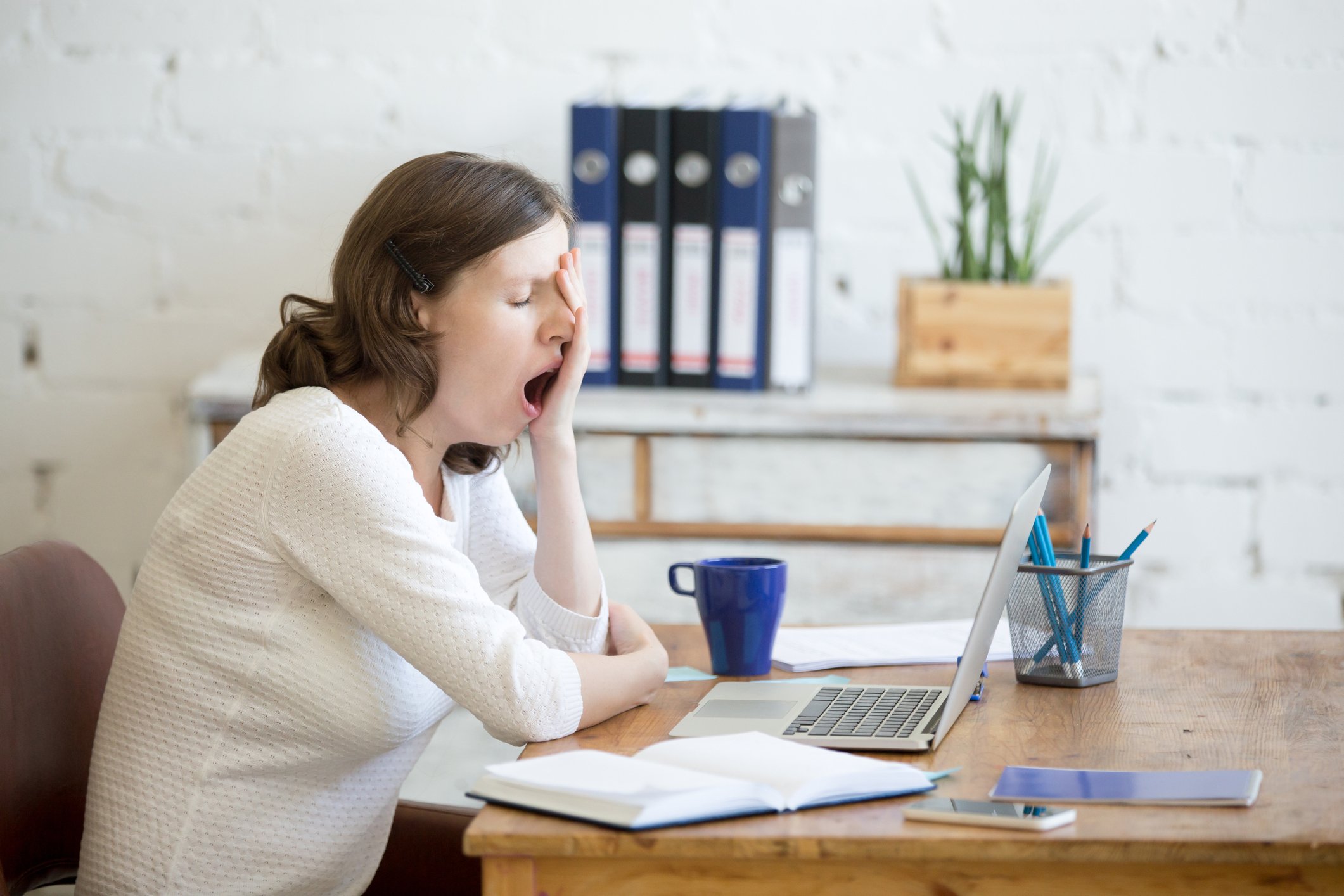
What indicates a restful sleep?
For the average adult of working age, 7 hours of sleep is the minimum required to experience restful and restorative sleep. Many people struggle with achieving the recommended 7-9 hours of sleep a night due to business and time management; however, at least 7, and ideally 8-9 hours of sleep assists with the physical recovery and mental refreshment needed to tackle the next day. A night of restful sleep is indicated if once the sleeper arises they feel increased energy levels, a generally well-balanced mood, and mental alertness.
Throughout the night, during unbroken sleep, you experience both REM (rapid-eye movement) sleep and NREM (non-REM) sleep. NREM sleep has its own sleep stages and it’s important to be able to move through all of them to experience the strengthening and recuperative effects of sleep. During REM sleep, you experience vivid dreams, as well as an increased heart rate. It takes about two hours of unbroken sleep to move through all the sleep stages, and completing multiple complete cycles through the sleep stages will allow for a better night’s sleep. Ideally, you will waken during NREM sleep to experience less grogginess and difficulty “coming back to reality.”
If you aren’t sure if you are experiencing sleep difficulties, you can try tracking your morning symptoms in a journal or calendar, or even keeping a sleep diary. There is also technological assistance to track your sleep patterns; there are multiple sleep tracking apps or devices like the Apple Watch or FitBit that can monitor your sleep and let you know about detrimental sleep patterns you may not be aware of.
What are the effects of ongoing sleep issues?
While the effects of sleep difficulties can be almost humorous at times - many people have broken the office into laughter with a well-timed yawn - chronic or ongoing sleep troubles are no laughing matter. Lack of adequate sleep can be extremely disruptive to a person’s mental functioning and has even been tied to increased chances of accidents. Insufficient sleep can be very dangerous for drivers, or operators of heavy machinery. Inadequate or interrupted sleep can also negatively impact your mental health and has been tied to an increased likelihood of anxiety, depression, and general emotional fragility. It is common to lash out or struggle to stay balanced due to just one day of exhaustion. For those who face ongoing sleep issues, it can be very challenging to cope. Long-term sleep deprivation can weaken your body’s defenses against more serious ailments, putting you at risk for diabetes, high blood pressure, obesity, heart disease, high blood pressure, and more. Given that sleep is how your body physically and mentally restores you, and emotionally assists in compartmentalizing your day, it makes sense that ongoing insufficient rest can leave you open to serious health consequences.
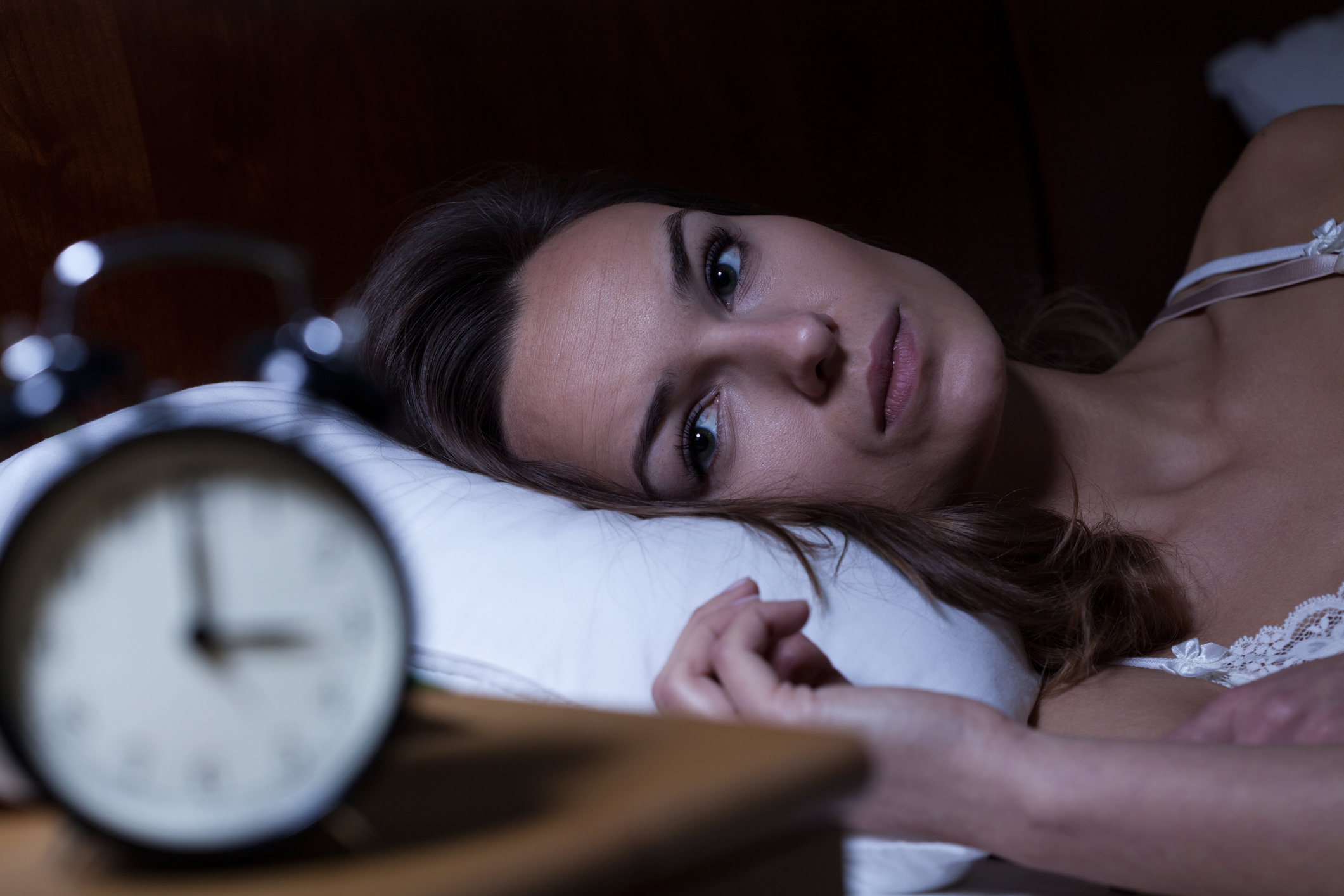
What can cause sleep issues?
There are many causes attributed to ongoing sleep issues, and whether or not you are impacted by these issues may depend on your lifestyle and daily habits.
Screens and sleep hygiene
One of the biggest issues impacting sleep quality is the lack of good sleep hygiene. Many sleep experts have been highlighting this essential practice as an unexpectedly vital way to counteract one of the central aspects of modern life: screens. Most people today use one or more screens throughout the day, from tablets to computers to cell phones to televisions. Not only does watching TV or even scrolling through apps on your phone engage you and disrupt the pre-sleep period of unwinding, but the very light they give off is problematic blue light. Blue light can cause eye strain and it can disrupt the production of melatonin, which is a hormone our body produces that triggers drowsiness. If your body’s melatonin production isn’t functioning properly, it can interrupt your ability to fall and stay asleep. It’s important to remove your devices from your bedtime routine, and if possible, put them away an hour or so before bed.
While screen control is a huge part of sleep hygiene, it’s also helpful to think of sleep hygiene as curating an atmosphere for yourself that is conducive to sleep. That can also mean drawing your curtains or installing thicker curtains to block light, reducing the temperature for a cooler sleep so you’re not tossing covers aside in the night, and cultivating anything that assists your sleep and removing what doesn’t. Some people find relaxing essential oils helpful, like lavender or chamomile. If white noise helps you sleep, you might consider a fan in your room, a white noise machine, or a radio with the volume turned low. It also might be an unexpected help to remove any sources of light in your room, like clock radios, or any other blinking light.
Fitness and lifestyle
If your day-to-day routine is largely sedentary, that can impact your ability to fall asleep. Studies have shown that those who engage in regular exercise also find it easier to fall asleep as well as to attain a deep, restful sleep. It’s not completely understood exactly what the link between exercise and sleep is, nor just how much and what type of exercise you need, but the general understanding is that aerobic exercise that increases your heart rate corresponds to an improvement of sleep quality. However, make sure you’re not sacrificing sleep for early morning exercise, or exercising too close to your bedtime, as that can increase your energy levels at a time when you should be winding down.
Pets and children
Sometimes sleep issues simply can’t be helped due to your lifestyle or family life. If you’re the parent of a newborn, you might not be sleeping more than snatches every night. Even when your children are a bit older, you can find yourself up multiple times in the night to comfort during illness, bed-wetting, bad dreams, and to fulfill all manner of parental duties. All you can do is keep working with your children to increase the quality and length of their sleep, which can benefit your sleep length, and work on getting high-quality sleep when you can.

People who sleep with their pets in the room are not a small minority - many people choose to sleep with their furry companions. This can negatively impact your sleep quality. You might get jumped on in the night, be woken up due to pet movement, or even find their midnight attempts at affection disrupting. For example, cats sleep for much of their day, but they sleep intermittently; that means they can decide the middle of the night is the right time to pounce on your toes, chase a dust bunny, or meow and pat your face for attention. However, staunch pet owners will also be happy to know there are some balancing benefits. Sleeping with your pet can strengthen the bond you share with them, and can assist with anxiety. It can be very cozy to have a morning snuggle-fest with your loving animal companion!
Caffeine Consumption
Caffeine is the most widely consumed stimulant in the world. It is found in coffee, tea, chocolate, and some sodas. Most people drink caffeinated beverages to help them feel more alert in the morning, and increase productivity throughout the day. Caffeine can be helpful when consumed in moderation. However, when abused, caffeine can be part of a harmful sleep cycle.
If you are getting poor quality sleep and drinking excessive amounts of coffee to make up for your tired state, you can both create a dependence on caffeine, and be harming your body by consistent lack of sleep. Additionally, if you are caffeine sensitive, just consuming 1-2 cups in the morning could be impacting your ability to fall asleep in the evening. Even the average drinker should limit consumption to the first half of their day, as studies show it takes about 6 hours for half of the caffeine you consume to leave your bloodstream.
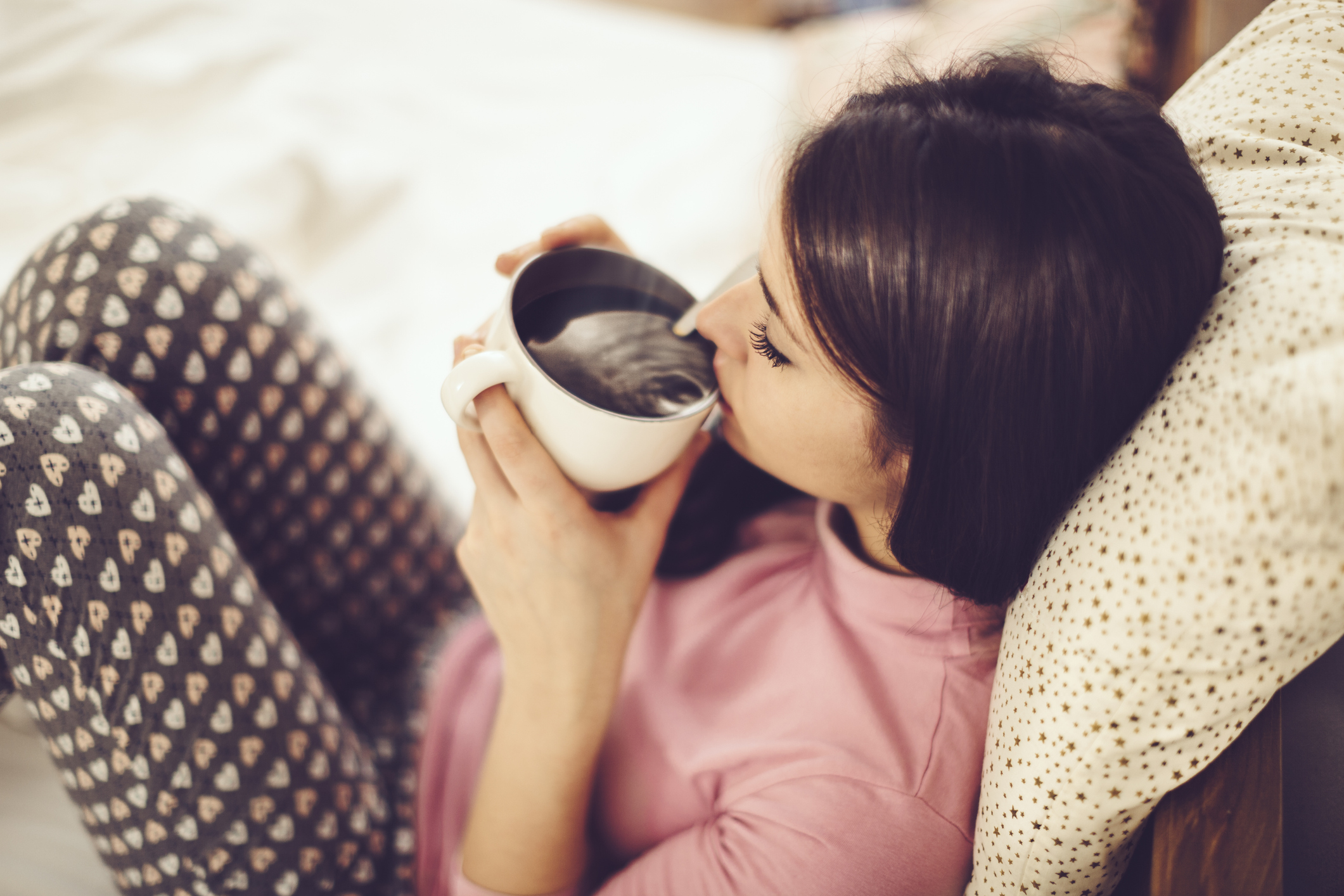
If you are concerned that caffeine is interrupting your ability to sleep, you can try to cut down or cut out caffeine for a couple of days - attempt a trial weekend caffeine detox! If you experience headaches or fatigue, that is a strong sign that you might have a caffeine dependence.
Some alternatives to assist with cutting down on caffeine consumption are to reduce your coffee intake and drink lots of water throughout the day, substituting afternoon coffee with herbal teas or golden milk. You can also try replacing coffee with matcha or green tea, which have a lower dose of caffeine but contain L-theanine, which has been shown to help with focus and mood.
Sleep Environment
In a perfect world, we could all fall asleep in a calm, cool, quiet room, with no ambient light or noises intruding on our slumber. Unfortunately, many people, especially urban city-dwellers, find that issues of sleep environment interfere with their rest.
It’s not always possible to eliminate ambient noise, especially if you live by a busy street, or in an apartment with thin walls. However, one way to work around street noise is through white noise or other soothing, low-volume sounds. Some people like fans, others find that recorded ocean waves or rain sounds can help by creating a calm audial atmosphere. There are many apps you can download that will play timed, calming soundscapes. However, we still suggest keeping any screens well away from your bed, with no visible light showing!
Speaking of light, streetlights shining in through your blinds can also impact your ability to go to sleep. If you can, get thick curtains that block out any ambient street light, or late night and early morning light during the summer months. Another solution is a cloth sleeping mask - you can even dab it with a soothing essential oil like lavender or chamomile, on the side not facing your skin, for a calming aroma.
Finally, your sleep area can pose problems. If your mattress or bed-frame is causing you any discomfort, or if your sheets aren’t ideal, that can interfere with your body’s ability to relax into slumber. Many people find changing up their sheet quality can be beneficial; natural fabrics have better breathability, and can be an excellent option for warm sleepers. Additionally, regularly cleaned sheets can have an excellent effect on your mood and sleep. Washing your bedding once a week on a regular basis can improve your sleep - and your desire to get to bed!
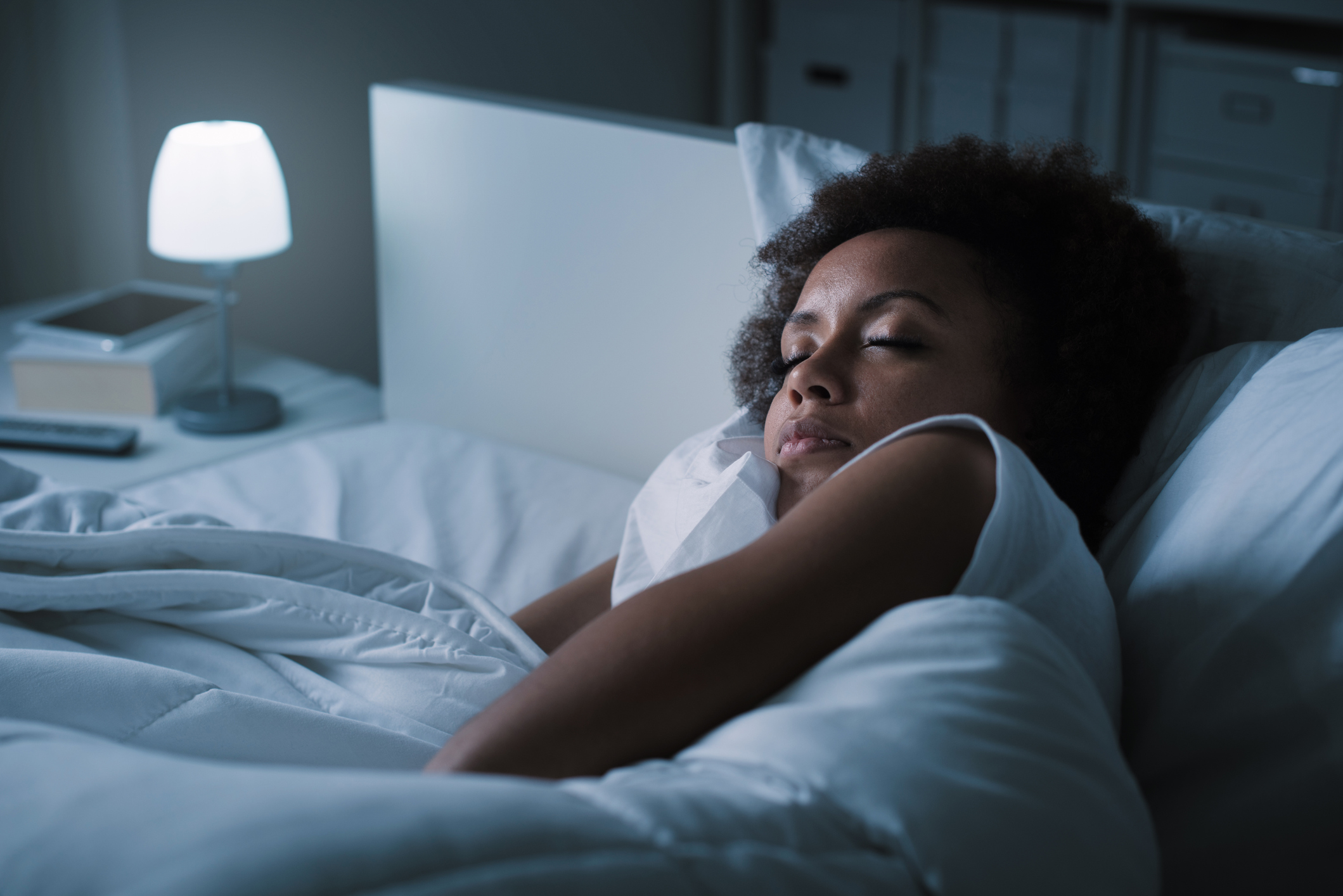
How can you improve your quality of rest?
Not only is it important to avoid problematic factors in your life that can cause sleep issues, it’s also essential to be proactive and include practices that can assist your ability to rest deeply in your day-to-day habits.
Sleep Routine
Never heard of a sleep routine? It’s just what you might think - a daily ritual you complete in the evening when you’re getting ready to go to bed, to help you wind down from your day and focus on rest. Ideally, you should establish a routine or ritual that can be completed the same way every day. This helps you set into stone the steps you will take to ensure healthy sleep. Your ritual steps should be what helps you relax and that can be different for everyone. Some people like to incorporate a skincare routine at bedtime - washing the day away and adding some gentle facial acupressure can be very calming. You can also do some gentle stretches, read a book, write in a journal, or lay your clothes out for the next morning - anything that helps you de-stress and prepare for the next day that doesn’t run the risk of overly stimulating your mind or body.
Physical practices
Some people choose to incorporate gentle yoga or meditation at bedtime as part of their sleep rituals. There is plenty of evidence that yoga can assist with poor sleep. There are specific poses that can improve sleep; however, depending on your familiarity with yoga or your comfort level, you could simply start with some easy stretches and slow motions and go from there. Some people prefer to practice yin yoga, or restorative yoga, where relatively easy and gentle stretches are held for longer periods of time, which can also encourage relaxing moments of reflective introspection. Similarly, some people find that practicing meditation as part of their evening routine or sleep ritual can help them get to sleep, especially if they struggle with anxiety or intrusive thoughts while lying in bed. Meditation can help you quiet your brain and get a bit of distance from any difficult events in your day. In addition to supporting your mental health, meditation allows you to move into a quiet, calm mental state that is perfect for slipping under the covers.
Supplementing for sleep
There are quite a few natural substances that can help with relaxation and rest, and many people incorporate herbs or other supplements in one form or another into their evening to prepare for sleep. Chamomile tea is a popular and well-known sleep aid, and some tea brands offer specialized sleep blends. Some folks swear by melatonin, other people like to apply calming essential oil roll-ons rather than drinking liquid at bedtime. There are many excellent natural options easily available. Some people are curious about going a step further than supplementing for sleep and wish to explore sleep medication. However, unless you have a prescription or advice from a doctor, it may be detrimental to turn to over-the-counter sleeping pills. There are risks associated with sleeping pills such as addiction, safety risks when driving or operating machinery, and simply using the pills to ignore the root cause of one’s sleep issues. There are many other ways to improve sleep, and many other natural options to try out. There are supplements specifically formulated to assist you with sleep issues, or you can work on increasing your overall wellness and relaxation to help you at the end of your day.
CBD For Rest
CBD, thanks to recent legislation which allows development of products containing it, is a hot new wellness trend. What is CBD? CBD is cannabidiol, which can be extracted from cannabis or hemp. Unlike THC, CBD is non-psychoactive, meaning you won’t feel any mentally altering effects, but there is some evidence to show that it can have health benefits. Specifically, studies have shown that it may be a way to treat anxiety and insomnia. However, it’s best to be cautious, and check with your doctor if you have questions. CBD is legal in Canada, and it is legal on the federal level in the United States, but there are still some state laws prohibiting it, so it’s best to refer to your local laws before you purchase any CBD products.
Screen Resistance
We’ve said it before, and we’ll say it again - put down your phone well before bedtime! There are multiple detriments to using your phone or another screen. Blue light can interfere with your production of melatonin. Melatonin is a hormone that supports a regular circadian rhythm and increases at bedtime to help you fall asleep, so its disruption can be very problematic for your rest! Additionally, using screens is mentally stimulating. Whether you’re browsing social media or checking your email, your mind is active and alert. Even simply reading a book on your phone still keeps you available for notifications. It’s best to put your phone or other screens away and focus on bedtime. Using the end of the day to disconnect and unwind, and to centre in on your partner, your family, or yourself, is a great way to increase your well-being and practice discipline around the ubiquitous presence of technology, while bolstering the bonds you have with your loved ones and with yourself.
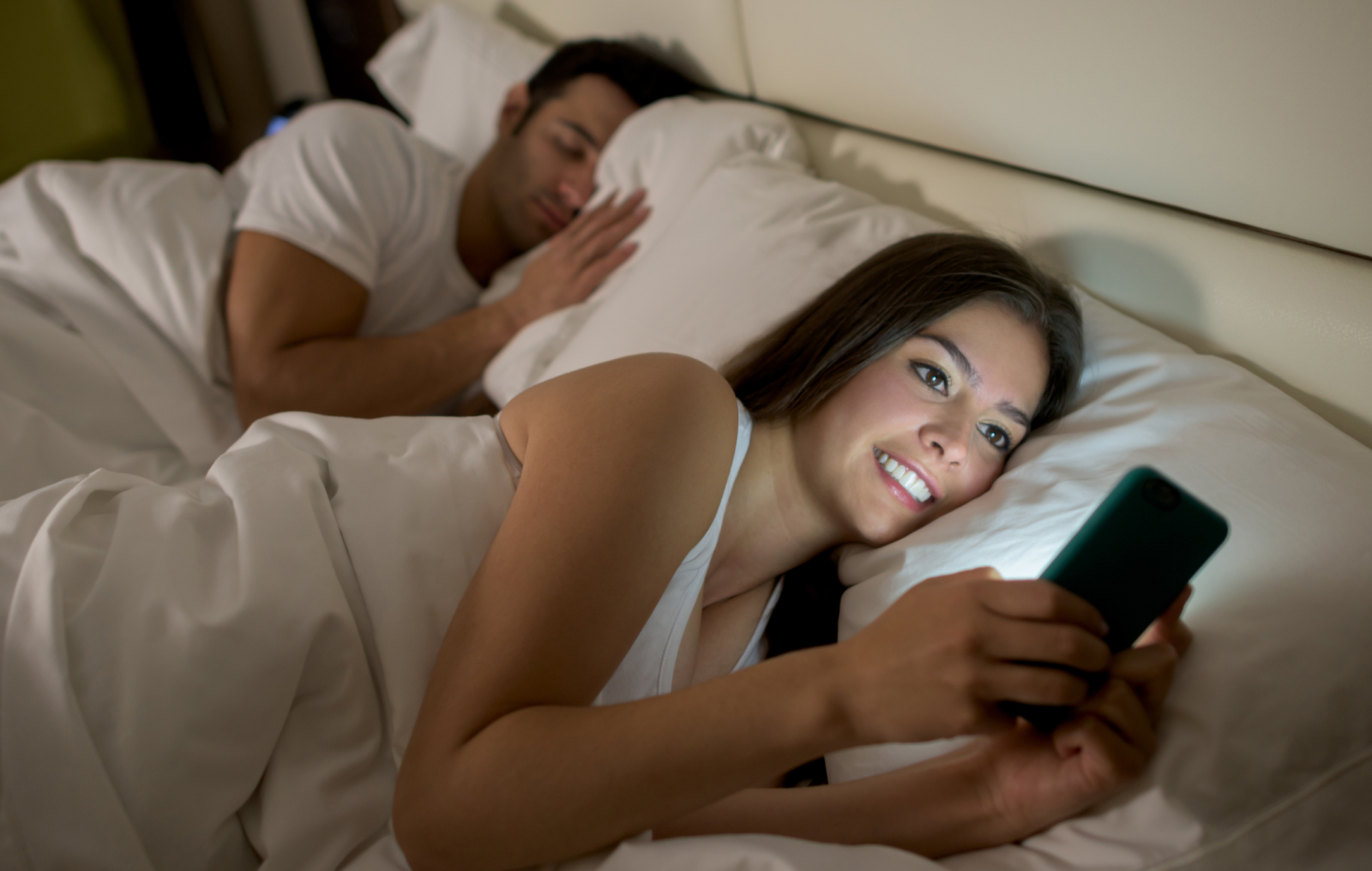
Join others who have successfully improved their sleep routine
It is absolutely possible to recover from a troubled pattern of insufficient rest, especially if there are external factors you are able to address. However, if you are struggling with other health issues contributing to your sleep loss, or you have the feeling that your difficulties with sleep might be more serious, such as clinical insomnia or sleep apnea, it’s important to consult your doctor or a health professional in order to receive expert, targeted care.
There are many strategies outlined both here and elsewhere to assist folks who are wishing to improve their sleep and perhaps reduce problematic bedtime habits. It can be incredibly easy with our busy, modern lifestyles to fall into a pattern of sleep debt, habitually getting less sleep than necessary and drinking coffee or cultivating a whirlwind of activities to stay productive. It’s also very common to have trouble putting your phone away at night or stay up later than you intend watching Netflix. Simply admitting to and beginning to address any patterns that are affecting your rest is a huge step! Repetition is key. If you find that adjusting your daily routine or creating a ritual is helpful, repeating it as often as possible will help your brain lock it in. Don’t get discouraged if you miss a day or two - everyone has setbacks and things that get in the way! Show yourself some compassion. The important thing is to keep trying and to be aware that improving your sleep is a significant aspect of creating a holistically healthy lifestyle.
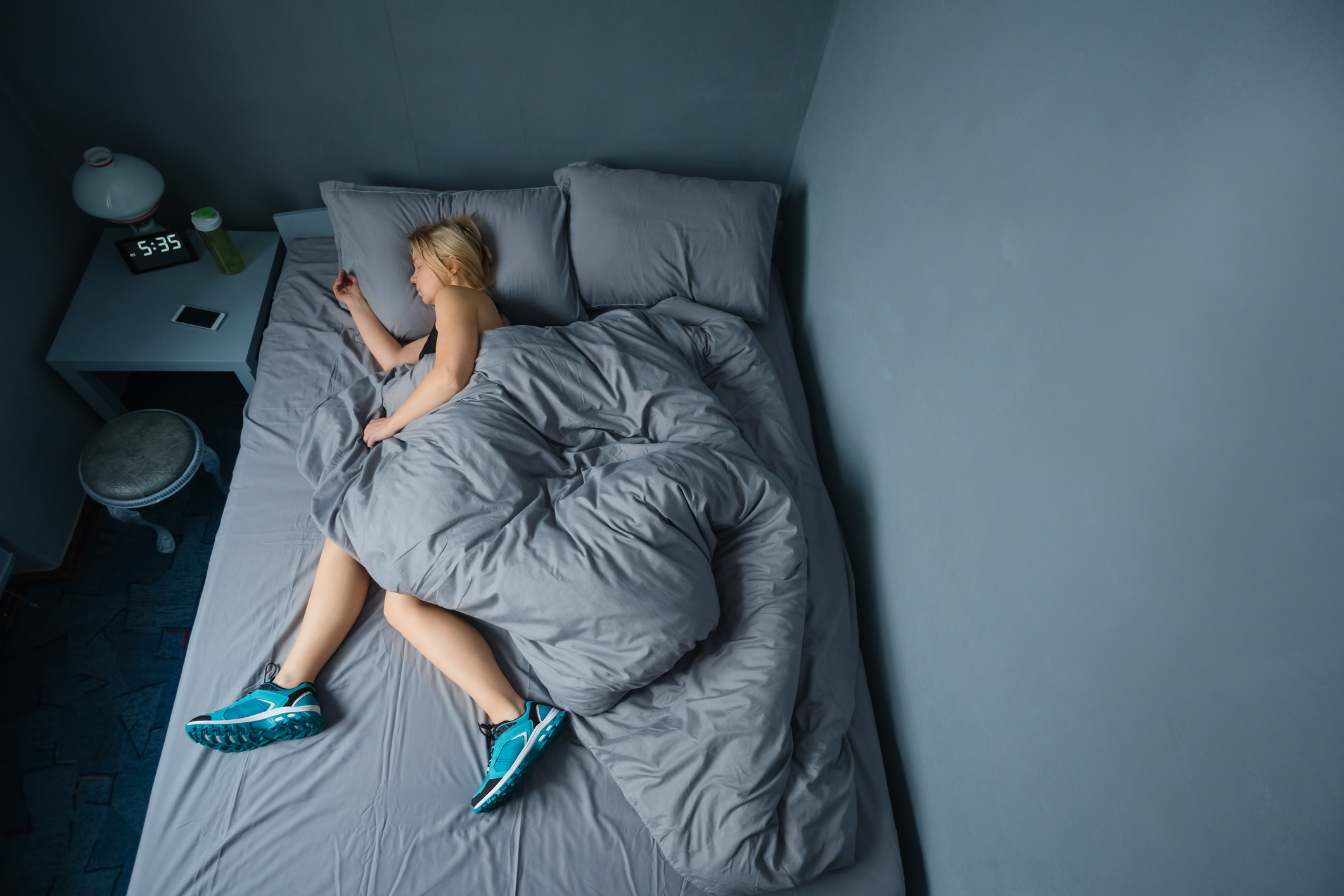


Leave a comment